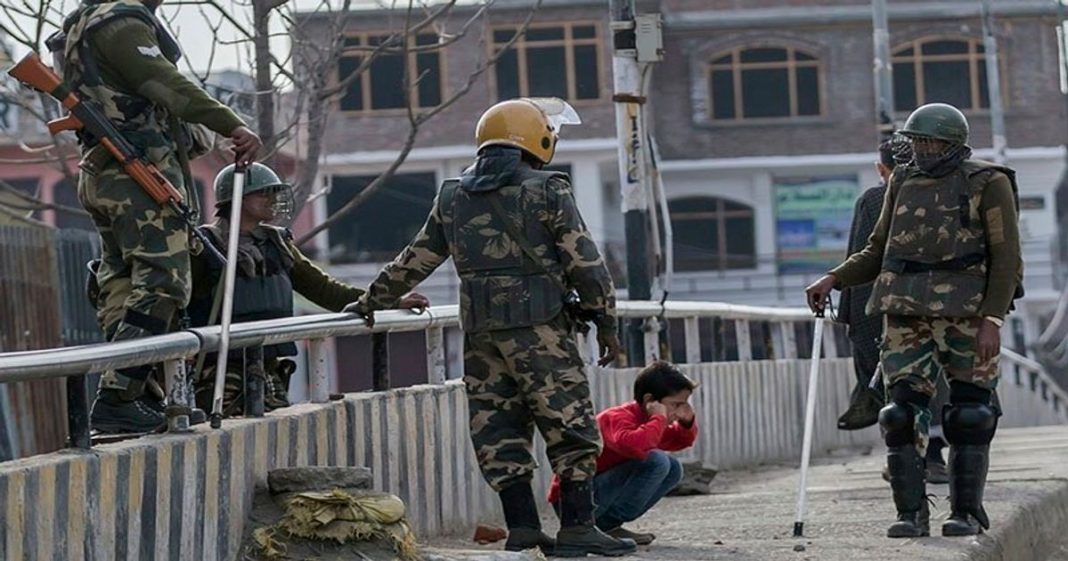Four freedom fighters were killed in Indian-occupied Kashmir on Monday during a gunfight with government forces, police said. India’s violence continues amid an appeal from the UN secretary general to come together and focus on eradicating the coronavirus pandemic. India’s violence in Kashmir continues despite the whole country being in lockdown for the past three months.
The Indian Army’s 55 Rashtriya Rifles and 183 Battalion of paramilitary forces launched a cordon-and-search operation in the Pinjora area of Shopian district early this morning following a tipoff that four to five militants were present in the area.
Police sources said that freedom fighters believed to be associated with the local outfit Hizbul Mujahideen fired on the government forces, which retaliated, and four mujahideen were killed in the exchange of gunfire.
The sources said three government troops were also wounded.
I was the second encounter in Shopian district in the past 24 hours, in which nine freedom fighters have been martyred so far.
On Sunday, five mujahideen associated with Hizbul Mujahideen were also killed in an exchange in which two homes and a cow shed were razed to ground. According to sources, a cow, ox and calf were also killed.
Meanwhile, the internet remains suspended for the second day in the district.
India’s violence in Kashmir continues
Despite multiple calls for a ceasefire, violence in the disputed region continues unabated.
Encounters, clashes and damage to property are frequent in the Himalayan valley, and there has been a spike in violence over the last three months.
According to figures compiled by the Jammu and Kashmir Coalition of Civil Society, a human rights group, at least 80 freedom fighters and 25 armed personnel have been killed in the region this year.
142 Kashmiris has been martyred during the last 10 months due to the Indian Army brutality in Indian Occupied Kashmir.
Read more: 142 Kashmiris martyred in 10 months by Indian army
Lives of Kashmiris had been made a living hell by the Modi government since India illegally revoked the special status of occupied Kashmir on August 05, 2019. It said that the move was aimed at snatching away identity of the Kashmiris through changing the Muslim-majority status of the occupied territory.
https://twitter.com/SonOfkashmir_/status/1268875175321272320
Kashmir is held by India and Pakistan in parts and claimed by both in full. A small sliver of Kashmir is also held by China.
Since they were partitioned in 1947, the two countries have fought three wars — in 1948, 1965 and 1971. Two of them have been over Kashmir.
Some Kashmiri groups in Jammu and Kashmir have been fighting against Indian rule for independence or unification with neighboring Pakistan.
According to several human rights organisations, thousands of people have reportedly been killed in the conflict in the region since 1989. India’s violence in Kashmir is to blame for the majority of these deaths.
Violence ongoing amid coronavirus, UN Gen-Sec appeal
India is exploiting the COVID-19 pandemic to perpetrate human rights violations in Indian-administered Jammu and Kashmir, Pakistan said on Friday. Thus, Pakistan moves OHCHR over Kashmir to ensure that the voiceless and nameless people of Kashmir are given a platform to counter the vicious narrative by the Hindutva-led BJP government.
Read more: Pakistan moves OHCHR over Kashmir
Addressing a virtual conference hosted by Office of the UN High Commissioner for Human Rights (OHCHR) in Geneva, Khalil Hashmi, Pakistan’s ambassador to the UN in Geneva, said: “The COVID-19 is being used as a smokescreen [by India] to perpetrate human rights abuses [in Kashmir] at a scale the world has not seen in recent times.”
He said Indian-administered Jammu and Kashmir has been under a “10-month digital and physical lockdown” since last Aug. 5 when India imposed a military lockdown to scrap the region’s limited autonomy.
In an appeal in March, UN Secretary-General Antonio Guterres had urged warring parties across the globe to lay down their arms in support of the fight against the novel coronavirus.
As the UN chief pointed out, COVID-19 does not care about nationality or ethnicity, or other differences between people, and “attacks all, relentlessly”, including during wartime.
It is the most vulnerable – women and children, people with disabilities, the marginalized, displaced and refugees – who pay the highest price during conflict and who are most at risk of suffering “devastating losses” from the disease.
Furthermore, health systems in war-ravaged countries have often reached the point of total collapse, while the few health workers who remain are also seen as targets.
#NSTleader Consider this. On March 23, UN secretary-general Antonio Guterres makes an appeal — his “the fury of the virus illustrates the folly of the war” plea — to world leaders to silence the guns everywhere.https://t.co/wi4vD3jaix
— New Straits Times (@NST_Online) April 20, 2020
The UN chief called on warring parties to pull back from hostilities, put aside mistrust and animosity, and “silence the guns; stop the artillery; end the airstrikes”.
India’s violence in Kashmir is a clear violation of this appeal, and its constant killing of freedom fighters and revocation of fundamental rights is a pressing human rights issue.
Anadolu with additional input by GVS News Desk













